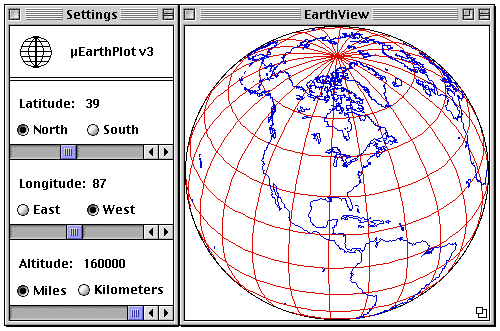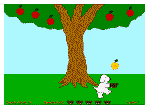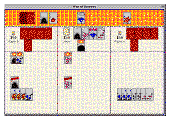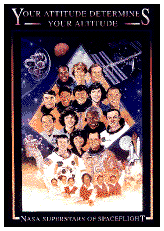1999 – The old saying “You get what you pay for” – besides being an excellent example of a dangling preposition – is usually pretty good advice. In the area of educational software for the Mac, there are some notable exceptions to the adage. My recent experience setting up a lab with just a few site licenses – and no budget to speak of – helped me get back into “cheap or free” in a big way.
When you start searching for free software, it’s really amazing what is out there for the taking. When I began this column, it was going to carry the subtitle, “Cheap or Free”. When I saw the volume of freeware available, and also realized the problems involved in defining “cheap”, I decided to simply stay with free. In addition, I’ve also omitted the many “lite” versions of various applications. When you have absolutely no software budget, which is all too often still the case for many educators, even “cheap” doesn’t cut it.
Word Processing for Free
I sang the praises of AppleWorks in the first column of this series, but there are several exceptional word processing programs available as free full version downloads. Nisus Corporation offers a full older version of their heavy duty word processor, Nisus Writer 4.1.6 (6148K). While Nisus Writer 4.1.6 is absolutely free, you will still need to go to the Nisus site for a serial number. You might also want to opt for the streamlined version of their current release, Nisus Compact (1198K). Besides being excellent free products, the Nisus web page also carries the following comforting thought, “We have found no Y2K-associated problems in any of our products.” You may already have a copy of these applications. Nisus Writer 4.1.6 appeared on the January and November, 1999, MacADDICT CDs (nos. 29 & 39). Nisus Compact was on the October, 1999, MacADDICT CD (#38).
A second full-version freeware word processor you might consider is WordPerfect 3.5e. This is one that I’d much rather see continue as a commercial product, but as Corel struggles with survival for WordPerfect, they have dropped Mac support and development of the excellent word processor. I’d purchased Corel Draw 6 long ago simply to get WordPerfect 3.5! While it truly is free, Corel does want a bit of info before you get to the download.
Both of the products above carry their own spell checker, but some products do not have that function. Newer Technology’s SpellTools 1.3.3 (1821K) can add that function to many applications, along with a host of other nifty tools. It can enable the Mac’s text-to-speech capability in nearly every program you use. My kids at school use it for reading Netscape and Internet Explorer documents on the Web. (Remember, I teach special ed.) I use it extensively in editing (listening for errors) my columns. Unfortunately, SpellTools breaks under Mac OS 9, but many Macs in many classrooms use older versions of the OS anyway. Newer is willing to listen to reader pleas for an update or paid upgrade.

Kent Forrest sent along a nice list of freeware and inexpensive shareware. One of his freeware picks that I especially liked is Alex Rosen’s Rainbox 1.3 (105K) “psychedelic paint program.” Rainbox throws a bunch of various filters and effects into one free program. It’s the kind of thing that is sure to delight the younger crowd. Even if Rainbox isn’t your thing, Alex has an interesting AlexWarp for Java on his home page that is definitely worth a click . . . and a giggle.
Earthplot (48K) is a nice “one trick pony” that does just what it says. It plots the earth from entered geographical coordinates. If you don’t know your latitude and longitude, the USGS search engine can provide the data for U.S. locations.

- WordSpell: Drag letters to form words; computer will (attempt) to pronounce them.
- MosaicPatterns: Design stained-glass-like patterns using a palette of 256 colors; designs are printable.
- ColorShapes: Drag various geometric shapes around the screen to form pictures; pictures are printable.
- Five-In-a-Row: Roll the dice and practice addition and subtraction skills in placing markers on the game board (1-4 players). Note: Do tell the kids that the “board” in this game will take an incorrect answer, so they’ll have to grade each other!
- PlayNotes: Play the onscreen “piano” keyboard; letter-name of note and its position on musical staff is shown.
I’ll let Kurt describe his purpose with KKGames:
My intention in writing the software was to design something that could be used within a classroom setting without disturbing students who are not using the computer. I find most children’s software to be rather like children’s TV, namely a bit “hyper” and certainly so noisy as to be annoying. KKGames consists of my first five attempts at writing programs for the Macintosh.
KKGames require a 68030 or faster processor, at least a 12″ color display, and Apple’s Speech Manager for WordSpell. (I tried to install it on an SE/30 this week. Read the docs, Steve!) I think Kurt did pretty well for his first try at Mac programming. Some of his other freeware and not-so-free stuff are available here.
Word searches are great ways to practice spelling words. Think about it. You have to repeat the letters over and over in your head while you hunt for the first letter(s) of the word. Brett Helbig wrote what he half jokingly called the “World’s Premier Word Find Creation program,” Word Find (159K). I’ve used this program for years to create some great word searches for my classes. It’s easy enough to use that upper elementary kids can do it themselves. The program will generate a good printable document. If you cut and paste the puzzle into a word processing document, you can get really professional looking results. Here’s a template you can use if you have ClarisWorks 4 or better.
Phonic Factory (1148K) is an excellent alphabet letter drill that includes consonant sound drills. While no longer posted on the LittleFingers Software site [domain has expired], it is still posted on AMUG.
I admittedly have a real problem with putting just plain games on school Macs. I really think our parents expect more than that of educators. Having said that, I’m sure there are some situations where some games might be appropriate in a school setting. One of the rewards the students in my classroom can buy with their behavior modification credits is time on the computer in a special games folder. I suspect that you could also justify some of these games for use in a lab or as manual dexterity drills, eye-hand coordination training, or some other educational lingo.
 Josh’s Apple Game (189K) is another app for the younger set. It’s a straightforward mouse movement game of catching apples as they fall from trees. It’s a very pleasant application from Eric M. Long, the author of Kids Clicks (452K). Kids Clicks displays a screen that has hot spots that can be linked to sounds. There are only a few modules (screens) available, but you can make your own using Apple’s free resource editor, ResEdit (464K), or Resorcerer. Eric has written some excellent directions that are included in the download! This is a freeware that never really took off, but should have.
Josh’s Apple Game (189K) is another app for the younger set. It’s a straightforward mouse movement game of catching apples as they fall from trees. It’s a very pleasant application from Eric M. Long, the author of Kids Clicks (452K). Kids Clicks displays a screen that has hot spots that can be linked to sounds. There are only a few modules (screens) available, but you can make your own using Apple’s free resource editor, ResEdit (464K), or Resorcerer. Eric has written some excellent directions that are included in the download! This is a freeware that never really took off, but should have.
When we set up our first school lab, Snake Byte (633K) was an absolute lifesaver. We had no software budget and most of us were just getting internet access. Snake Byte is a simple to learn game that requires just two direction buttons. It’s a great diversion, and I think, somewhere along the line, tells us a bit about our kids as we watch them work with it.
Pangea Software’s Nanosaur is a great recess or reward game. It runs best on G3s with graphics acceleration but performs quite acceptably on my G3/7500 without extra graphics help . . . as long as you don’t touch the Return key! Pangea is the maker of Bugdom, a commercial game.
TicTacWeg (100K) by Sebastian Düvel is a one or two-player Tic Tac Toe game.
Whenever I come up empty for something for my kids to color at school or a new application to catch their interest (or fill my column), I click right over to Grace Sylvan’s Kids Domain. This week is no different, as the What’s New page has many interesting commercial demos, sharewares, and freewares.
Ian J. Lander’s freeware Virtual Hamster (1236K) immediately caught my eye. While there’s not a lot to this application, there’s also virtually no learning curve, and the price is certainly right!
Robert Schenk’s FrankenStein’s Helper (100K) has grades 6-9 listed as target ages, but could be used with younger kids as well. It’s a good exercise in following written directions and seems entertaining as well. Schenk is also the author of the math drill, Be Fruitful and Multiply (310K), which is excellent for kids who just don’t get the concept of multiplication.
 War of Flowers (269K) by Minho Choi is an oriental card game. It requires a good bit of reading and studying of the instructions that are included inside the application. Once past that hurdle, it seems to be a good matching exercise game. Formerly a shareware, War of Flowers became a freeware in its last release. As you might expect, the oriental graphics are interesting and attractive.
War of Flowers (269K) by Minho Choi is an oriental card game. It requires a good bit of reading and studying of the instructions that are included inside the application. Once past that hurdle, it seems to be a good matching exercise game. Formerly a shareware, War of Flowers became a freeware in its last release. As you might expect, the oriental graphics are interesting and attractive.
For a classic arcade treat, you might download the new release of Pac the Man for your students or yourself. It’s a freeware, color rendition of the classic PacMan, available with (4136K) or without (580K) sound files.
 NASA has released several PDF files that might be of interest. Our Mission to Planet Earth (1859K) is a 60 page teacher’s guide for grades K-4. It includes activities such as setting up a terrarium as an earth system model to demonstrate the water cycle, the greenhouse effect, and the difference between global warming and cooling. Superstars of Spaceflight (2228K) includes a nice letter size poster of some of the astronauts and biographies on each. The Aeronautics Educator Guide (3167K) includes some great school, club, scout, or home activities. A full listing of this series of releases is available at NASA’s Spacelink page.
NASA has released several PDF files that might be of interest. Our Mission to Planet Earth (1859K) is a 60 page teacher’s guide for grades K-4. It includes activities such as setting up a terrarium as an earth system model to demonstrate the water cycle, the greenhouse effect, and the difference between global warming and cooling. Superstars of Spaceflight (2228K) includes a nice letter size poster of some of the astronauts and biographies on each. The Aeronautics Educator Guide (3167K) includes some great school, club, scout, or home activities. A full listing of this series of releases is available at NASA’s Spacelink page.
If you’re an educator or a parent, be sure to visit the Kids Domain site. (Not now! Do it after you read this column.) It is by far the best site of its type that I have found.
Virtual Freeware
What is virtual freeware? There are some sharewares out there that you just can’t register. I know. I’ve tried. The authors have disappeared without forwarding addresses, or they can no longer accept registration fees for one reason or another.
Math Flash Bash (78K) is one of my all time favorite fact drill applications. It drills any combination of addition, subtraction, multiplication, and division facts in a quick, enjoyable way. Flash Bash offers a choice of operations and has various controls for what facts are presented and how many facts in a set. Samuel Davidoff is listed as the author of this “$5” shareware, but my check was returned by the post office as addressee unknown. It has also dropped off all of the usual software download sites.
PhrazeCrazePlus (117K) by Brad Pettit is a great vocabulary and phrase game that has almost disappeared from the web. It contains its own list of puzzles, but you can easily write your own. Brad wrote and “sold” the program, only to receive little or nothing in return for his efforts. When he finally regained rights to the program and tried to market it as shareware, he had to stop collecting fees on it because of “legal hassles.” He now asks that fees “be directed to the nearest food bank or goodwill in the form of money or food.” Thanks to Peter Carbonetto for keeping a PhrazeCraze Unofficial Home Page and preserving a classic Mac educational software. To make your own puzzles, you’ll probably need to use a Mac running System 7.0.1 or 7.1. The puzzle conversion utility crashes my Macs on anything later. I convert my special puzzles on a Mac SE!
Time Teacher (32K) by Harry Wolfson is a program for reading the time from analog clocks. It presents an analog clockface with four choices of digital times. It increases in difficulty as students get more and more responses correct. While it works great on our Mac SE’s, 7200, and 7500/G3, this 1993 revision of a 1990 program crashes on all of our 68030 machines (SE/30, LC III, IIfx)! I’ve not been able to contact the author, but the ReadMe file lists a shareware fee of just $5! I’ve placed it in my “virtual shareware” section, but if Harry ever writes, I owe him a fiver or two!
As I waded through all the emails full of suggestions for this column, I was faced with the task of finding the various software titles on the Net. Fortunately, my copy of the Macintosh Products Guide CD had arrived this week in a mailing from Apple Ed. It helped tremendously in finding unfamiliar apps recommended by readers. If you didn’t get the CD in a recent mailing, the database is available online.
Gradebook Follow Up
And the winning electronic gradebook is . . . probably none of the ones I mentioned last week. But boy, did I find out that Easy Grade Pro from Orbis Software has a loyal and literate group of users (they read my stuff, don’t they?). When I opened the demo for the $49 program, I could see why users would recommend this app. It has an easy interface that does the basic job of recording and averaging scores, along with a host of extra features. Easy Grade Pro (1049K) is currently a Mac-only application, but a Windows version is under development.
Other gradebook programs recommended by readers that I didn’t mention include Schoolhouse Software’s $69 The Mac GradeBook, available for (943K), Power Mac (490K), or PPC or 68K (457K), The Chariot Software Group’s $95 MicroGrade in Mac Elementary version (1131K), Mac higher ed (1116K), and Windows (1390K), and Jackson GradeQuick in Mac (2082K), DOS (319K), and Windows (2737K) versions.
Jennifer Beagle, a middle school science teacher, wrote of her husband’s creation, Test Scores. While it’s not a full gradebook program, Mrs. Beagle described the $5 shareware as “a nifty, helpful, timesaving program to grade tests and quizzes.” Sounds as if Mr. Beagle has at least one loyal fan!
Publisher’s note: Once again, we have lots and lots of links. We’ve fixed the ones we could, but nearly 17 years on, there are a lot of dead links. You may want to check Steve’s version of this article on his Mac Dittos 2 website.
Keywords: #macfreeware #macshareware #freeware #shareware
Short link: http://goo.gl/nv2z1r

